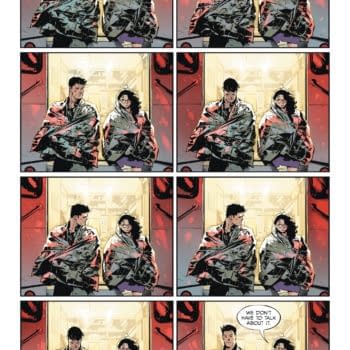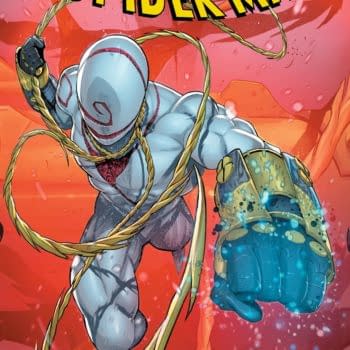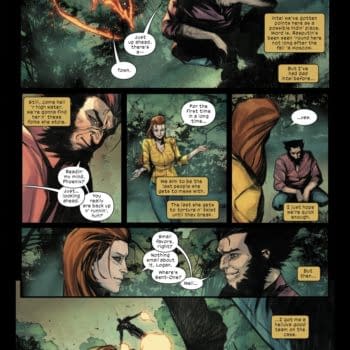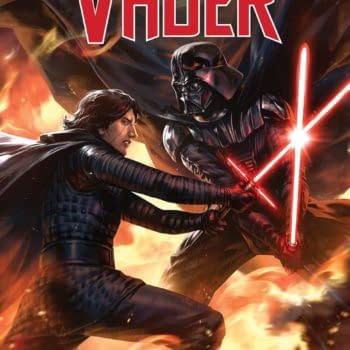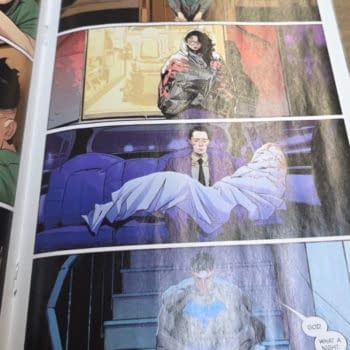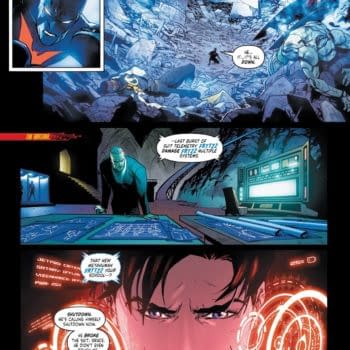Posted in: Comics, Recent Updates | Tagged: avatar press, Comics, entertainment, god is dead, jonathan hickman, mike costa, Rafa Ortiz
When God is Dead, Armageddon Follows – The Bleeding Cool Interview with Mike Costa
God is Dead launched from Avatar Press (the owners of Bleeding Cool) back in September, co-written by Jonathan Hickman (Fantastic Four, The Ultimates, Pax Romana) and Mike Costa (The Secret History of The Authority, Transformers, Blackhawks) , with art by Rafa Ortiz (Dan the Unharmable, Crossed). The premises behind the book were bracing, unpeeling some of the layers we often see in comics dealing with mythological figures. In Marvel's Thor, we have Asgardians, but in God is Dead, we have fully realized Norse deities out to conquer the world and crushing hapless mankind in the process. Only there are also a wide array of pantheons including Egyptian deities and Mayan deities drawn from several cultural traditions, and they are all bent on conquest with their sights set vengefully on each other.
Because the series lays bare the mythological components of many hero comics, and renders them unheroic but fairly sublime in their raw power, it plays with the idea of people, and readers, getting what they really think they want and finding that, of course, this is not a consummation to be wished for. A sidenote to the violence and the human reaction, including attempts at building their own gods to take part in the struggle, is the often quite hilarious dialogue as ancient mythical beings deliver grandiose reparte. In the first 6 issues of the comic, we witness a kind of survival of the fittest and most bloodthirsty among the vying pantheons, and with issue 7, a new arc called "Armageddon" kicks off, this time with full writing duties in the hands of Mike Costa
Now, when you start off with a title like God is Dead, do we really expect that Armageddon won't follow? But when I talked to Mike Costa about his views on the developments in the book, and in particular about his plans for "Armageddon", he surprised me by pointing out that gods can both destroy worlds and create them. It reminds me of a little known aspect of Norse Ragnarok mythology (or at least remarkably under-emphasized) that after the end of the world, a new world is actually supposed to rise up from the ashes under a surviving sapling of the World Tree. Those kinds of roots in actual mythological patterns are what interest me most about God is Dead. This is mythology unfiltered, and in exploring myth, the series says a lot about comics history and comics future. Here's what Costa had to say about God is Dead and "Armageddon":
Hannah Means-Shannon: Did you ever think that by writing comics you'd end up working directly with mythological gods? Did you have any previous interest in mythology?
Mike Costa: Well there's a certain perspective that superhero comics are our modern day myths. They're larger than life morality plays or powerful symbologies that we reenact and retell over and over again. But then again, I'm not Grant Morrison and I don't do 'shrooms, so I'll just give you a straight answer and say "no." I didn't ever expect to write a book like this, and I owe Jonathan Hickman a lot of thanks for that, because I actually was really into mythology as a kid and working on this book has been a real blast.
HMS: How do you develop characterization and dialogue for beings so much larger than life while keeping them relatable to readers?
MC: Well, I'm about to venture into Grant Morrison territory again (but the guy's a legend and a genius so I could do worse), but the interesting angle for me on these mythological beings is to not see them as characters so much as cultural artifacts. I dusted off my old Elaine Pagles and Edith Hamilton and really did my best to try to understand what these Gods MEANT, and from there tried to extrapolate who they would be as characters. Which is really just a long-winded way of saying that I think Gods of antiquity are immanently relatable to readers because they are, after all, representative of what's inside of us. They are our lusts and our anger and our fear and our desire for power. (Of course, I focused on a lot of the ugly and destructive things because this is that kind of book.) Once I worked all that out, the Gods end up being the simplest characters of all to write. They're pure power, pure id. They aren't conflicted or uncertain. They are exactly what they are, and that, I think, is very compelling.
HMS: You've worked on military-based and science fiction comics before, but what are the challenges of trying to convey vast conflicts in every issue of a comic while keeping the reader from getting desensitized to its importance?
MC: One lesson I've learned and done my best to live by is that, regardless of what your story is, be it giant robots or covert operators or the Gods themselves, the only thing that a reader can really care about is character. A plot twist can be stunning and an action scene can be thrilling, but all of it will feel hollow if we don't care about the people in the story that are wrapped up in all of it.
I've done my best to make these iconic, totemic deities interesting without betraying the larger things they're supposed to represent, but the three human characters who play important roles in this story are the ones I'm most proud of. Each of them is very different – and their perspectives on the events are very different – and each of them ends this arc in a very different place than where they started it. I mean, the "hero" of this story (if you can call him that) is an overweight, middle-aged Australian Aboriginal who wears a Hawaiian shirt and scandals. He's not the kind of character you expect to see in a story like this, and those are the kind of people I'm interested in. I can't think of a story more compelling than identifying what a character wants most, and then giving it to him.
HMS: What are some of the key ideas you want to leave readers thinking about in your upcoming arc "Armageddon"?
MC: Well, first off I want them to have a lot of fun reading a book about Gods scheming and betraying and beating each other to death. Those are simple pleasures, and I don't want it ever to be said that I'm not a man of simple pleasures. But I also know that a good story has to be about more than carnage, and one of the key themes explored by this arc is the idea of responsibility. What is our responsibility to our world when the powerful are corrupt or incompetent? What if we are unequal to our responsibilities? There are a lot of schemes and plans in this arc, a lot of people who think they know best, and almost every single character over-reaches. The story is really about those horrible – often violent – consequences.
HMS: How far could this series potentially go? Are there further arcs beyond "Armageddon" possible?
MC: Oh there are definitely plans. And if the Gods (and sales) are good, then you'll see them. I know this arc is called "Armageddon" but this series could potentially go on for a long time, and I really hope it does. Because, after all, Gods have the power to destroy the world, but they also have the power to remake it, and I'm very interested in that idea as well, and the horrible price it would incur.














